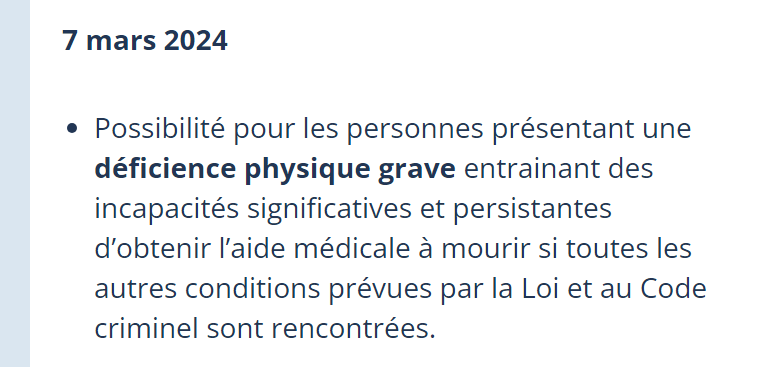Last week, an impressive International Meeting on end-of-life issues, euthanasia, and assisted suicide took place in Paris. It was an honor to co-organize this event with the European Institute of Bioethics and Alliance VITA, the project’s initiator. Nearly 10 years after the adoption of the End-of-Life Care Act in Quebec (June 5, 2004), it was very pertinent to have an exchange with experts from the Netherlands, Belgium, Switzerland, and Canada on the undesirable consequences of allowing access to euthanasia and/or assisted suicide. We have plenty of video content to offer you and hope you will be able to see the dire consequences yourself!
In this communication, we will also address the adoption of Bill C-62, the new availability of MAiD in Québec for people with a serious physical impairment, and have included our weekly Press Review.
We hope you enjoy reading (and watching the videos of the International Meeting),
Jasmin Lemieux-Lefebvre
Coordinator
Living with Dignity citizen network
Video recap of the Paris Conference

There are two ways for you to to relive last week’s event that brought together international experts such as Prof. Theo Boer (Netherlands), Dr. Catherine Dopchie (Belgium), and Prof. Trudo Lemmens (Canada):
1) Via the official event page (in French) and
rencontreinternationalefindevie.org
2) By our website in English, where we have focused on all Canadian speeches (including those of Living with Dignity, by Jasmin Lemieux-Lefebvre) and summarized the contents offered: vivredignite.org/intl-meeting-paris-2024
Here is an excellent summary of the day, taken from the Press Release of Alliance Vita (in French):
As France considers legalizing euthanasia and assisted suicide, Alliance VITA, along with the European Institute of Bioethics (IEB) and the citizen network Living with Dignity, gathered on February 28th at the Maison de la Chimie, a dozen experts from Belgium, Canada, Switzerland, the Netherlands, as well as an American testimony for an international meeting on end-of-life issues. Each of them came to share the impact of euthanasia or assisted suicide practices in their respective countries. The legalization of euthanasia or assisted suicide was based on a triple promise in each of these countries, the credibility of which was assessed during the international meeting:
– Euthanasia and assisted suicide will only be allowed exceptionally.
– The support for vulnerable or end-of-life individuals will not be affected.
– This “new individual right,” which will not harm anyone, will have no consequences on others.
The cross-experiences confirmed, through three round tables—legal, medical, and social—how unsustainable these promises are.
Thank you to all the participants of this meeting and to Mrs. Caroline Roux, Deputy General Director of Alliance VITA and Director of VITA International, and her team for their invitation to us to actively participate in this event. The concluding message (in French) from their spokesperson, Mr. Tugdual Derville, deserves your attention.
Adoption of Bill C-62
The Canadian Senate ultimately neither amended nor blocked the adoption of Bill C-62 – An Act to amend the Criminal Code (medical assistance in dying) – which received royal assent on Thursday, February 29th. Eligibility for medical assistance in dying (MAiD) for individuals solely suffering from a mental illness is thus postponed until March 17, 2027 (as summarized by Health Canada). Over the next three years, we will explore with our allies all possibilities for the temporary exclusion of MAiD for mental illness to become a permanent one!
Eligibility for Medical Assistance in Dying (MAiD) for a serious physical impairment in Quebec

On the day following the implementation of the articles of the Quebec law authorizing medical assistance in dying for people with a serious physical impairment (9 months after the adoption of Bill 11), we offer you two reflections on the issue:
1) As seen in the London Free Press, an open letter by Gabrielle Peters, a disabled writer living in Vancouver, who is the co-founder of the Disability Filibuster:
To trust the state to operate a service that kills (ends the life if you prefer) people, including disabled people who are not dying, all you have to do is believe, in spite of an abundance of evidence to the contrary, that an error-proof and abuse-proof government program is possible. And in this perfect program every mistake and misdeed will be caught and stopped in sufficient time to prevent harm. If you find yourself thinking that the chance of seeing Bigfoot riding a unicorn seems more plausible, please know you are not alone.
2) As seen on the YouTube page of the Citizen Movement Handicap-Québec (in French): Its president, Richard Guilemette, presents the genesis behind the creation of the short film “Last Offer” with Laurent Paquin and Dany Audet. He discusses medical assistance in dying that can now be offered to disabled people when their first wish is to have access to basic care in the living environment of their choice.
Press Review
As reported in Le Devoir, an article by Stéphanie Marin:
In her judgment dated March 1st, Judge Catherine Piché of the Superior Court rejected the stay request filed by the Archbishop (of Montreal). She also refused an exemption that would have been valid only for Maison St-Raphaël, located in the Montreal borough of Côte-des-Neiges.
Morning interviews on March 7, 2024, as MAiD is now accessible to individuals with a serious physical impairment (in French):
Heard on 98.5 FM, an interview with Paul Arcand featuring the
Minister Delegate for Health and Seniors, Sonia Bélanger.
Heard on ICI Première, an interview with Maxime Coutié featuring Mr. Luc Mathieu, nurse and president of the Order of Nurses of Quebec.
MAR
2024
